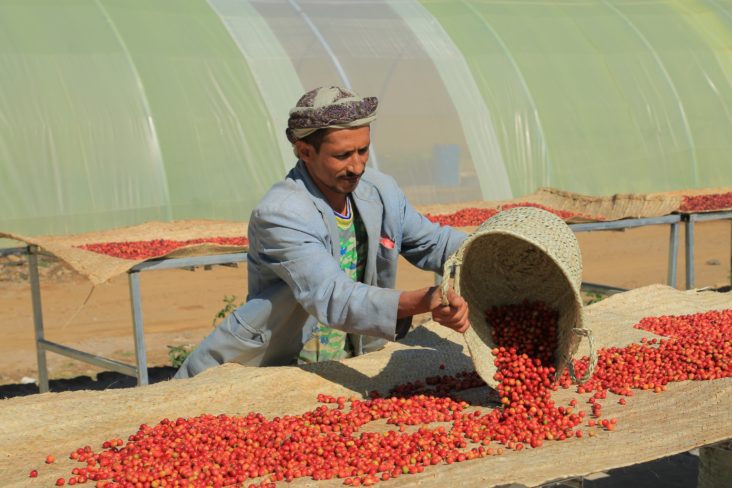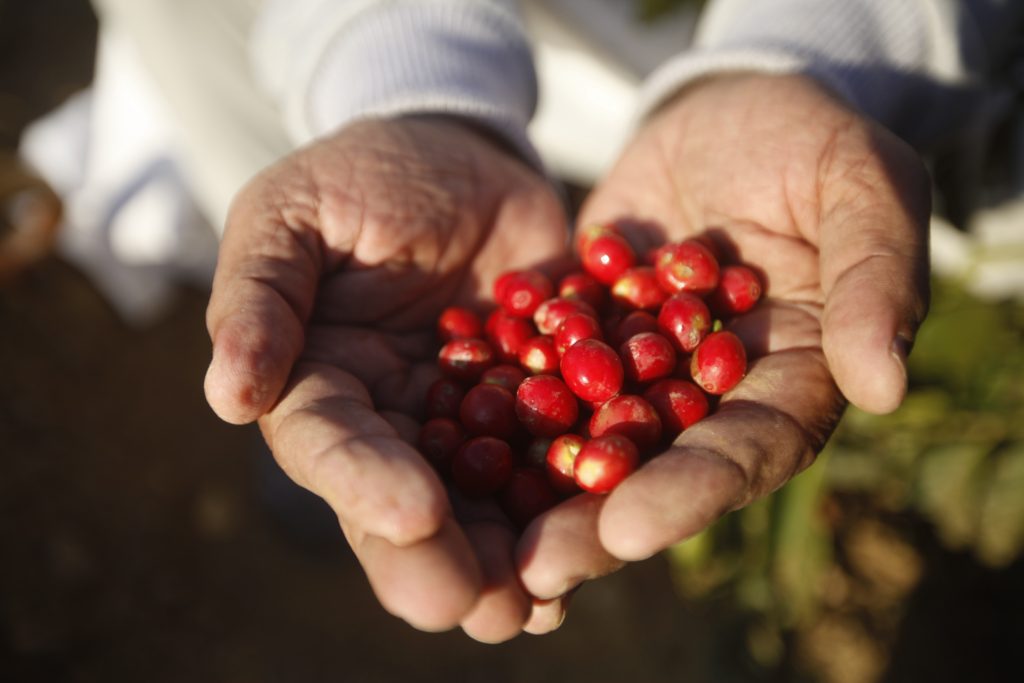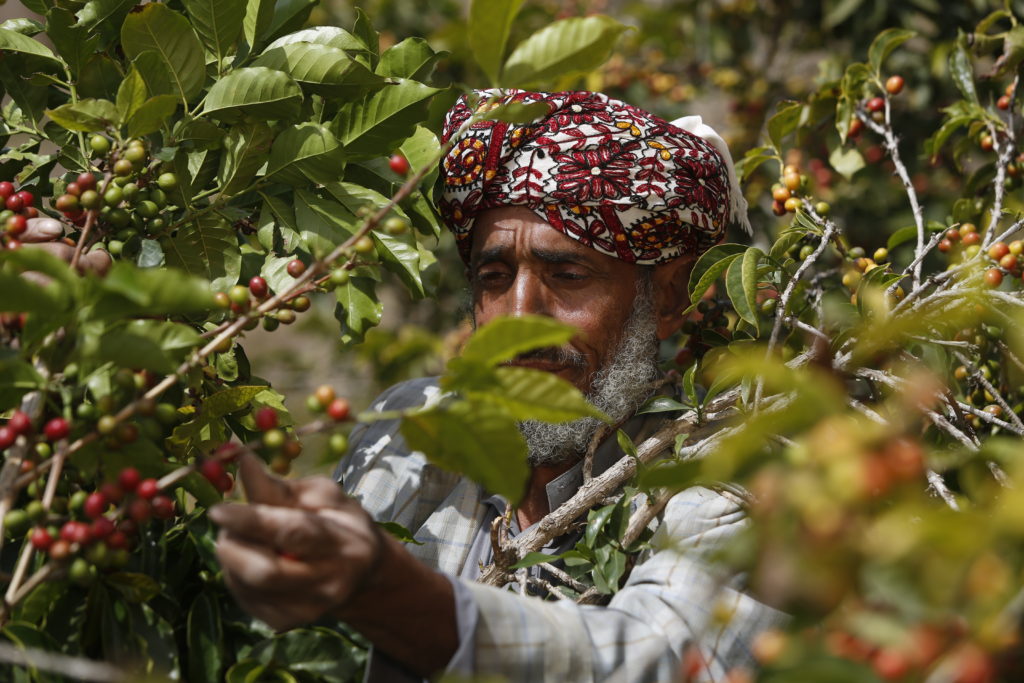Sheikh Dr Majid Al Qassimi And Emirati Entrepreneur Ali Mansoor Al Ali Launch Yemen-Sourced, Fair Trade Coffee Brand Connecting Farmers And Consumers

Sheikh Dr Majid Al Qassimi and Emirati entrepreneur Ali Mansoor Al Ali have announced the official launch of a brand-new product sourced from Yemen, People’s Coffee, which targets the discerning consumer with a powerful message – to improve the quality of life of farmers and bring their stories to the world.
Fuelled by an increase in demand from consumers for ethical coffee production which does not exploit farmers in developing countries, the new range brings the best of authentic Yemeni coffee to the UAE, while raising awareness over its heritage and the human aspect behind every batch of beans.
“People’s Coffee strives to support the communities that sustain the beans and their manufacturing process at Jabal Haraz in Yemen,” says Sheikh Dr Al Qassimi. “The product draws on the rich heritage of the country’s mountainous roots; this People-inspired brand supports our values by assisting farmers.”
Headquartered in Dubai, the coffee trading company stands firmly against mass production models, promoting a human-to-human approach to business. With the slogan “Fair Value Coffee Traders”, People’s Coffee has devised a system whereby financial returns are distributed equally across all parts of the supply chain.
“The idea behind People’s Coffee stems from an increasing consumer interest in the character of the beverage, the story behind it, and distinctive, exquisite high-quality beans,” says Al Ali.“The product will be available at different venues, starting with Dubai’sever-popular The Climbing Goat Roastery, and later for direct purchase from our company.”
For roasters, Jabal Haraz’s offering tells a tale of its own, enchanting coffee-lovers across the globe. “It is all about the experience, making a connection,” says Jei Maverick Santos, head barista and roaster at The Climbing Goat Roastery, who is collaborating with People’s Coffee to bring the rich-bodied taste of these particular beans to the UAE.
“The beans we are using, which come from Yemen’s Haraz region, can be categorised into different variations – one complements milky beverages and boasts chocolate, roasted-nut and citrusy notes. The other works best with filtered coffee, and has a tea-like feel to it, with fruity notes that evoke strawberry, red cherry and dark chocolate,” he adds.
By encouraging consumers to direct their attention towards the voices behind the new balance-seeking brand, People’s Coffee aims to achieve its goal of supporting farmers in battling any challenges they may face; these include the effects of a changing climate, low and unpredictable incomes and even a scarcity of food supplies for three to four months a year – a problem which often plagues coffee-growing communities.
With a background in agriculture and having been assigned an advisory role at the UAE Ministry of Climate Change and Environment, Sheikh Dr Al Qassimi drew on his experience throughout his journey to discover what is known as “the world’s first coffee” in Yemen, with origins that date back over 500 years ago.
“One of the most discussed topics in food production today is how to protect the farmer, who is on a very tight profit margin and suffers from low income. Nowadays, most processes benefit the retailer. So, how do we allocate value back to the people who are unable to earn a reliable living from the coffee that they themselves produce?” adds Sheikh Dr Al Qassimi.
The complexity of the coffee supply chain lies in the fact that beans pass through the hands of growers, traders, processors, exporters, roasters and retailers until finally reaching the consumer. According to the UK’s Fairtrade, most farmers have little idea of where their coffee goes or what price it ends up selling for.
“People’s Coffee is for everyone – whether it is those who produce it, sell it or consume it. In that way, we believe that there is a strong message and mission behind this brand. With the consumption levels and culture here, we have created a premium, Yemeni-sourced coffee product of the quality that consumers expect, while simultaneously helping the farmers who work very hard to bring it to the world,” highlights Sheikh Dr Al Qassimi.
Focusing on the region’s café-oriented culture, the beverage’s meditative properties and a market which is projected to show significant growth in the UAE until 2026, the Emirati duo aims to tell the story of farmers through different means – including digital platforms and social media.
“Through digitisation, we will be emphasising the human-to-human connection. At the end of the day, it is not about us, but rather the consumer who tastes the coffee and should have the knowledge of where it comes from and who is doing the real work,” adds Al Ali.
“On most packaging that we find in the market today, consumers can see roaster-centric branding; it does not mention who the farmer was or go into detail about the origins of the product and the hands behind the brew,” says Sheikh Dr Al Qassimi. “We are about to change that; we will transport the consumer to the farm.”
With less layers between the farmer and consumer, People’s Coffee will be made available at accessible pricing. “I do not want to create a gold leaf coffee bean,” says Sheikh Dr Al Qassimi. Exclusivity is neither going to help the farmers nor their journey. We need the people to be able to access the product, so that they can explore the beautiful stories behind it.”
In times of pandemic, and in the wake of the devastating effects of Covid-19, the entrepreneurs have become more adamant on getting the message across. “I have been in advertising for many years and, when filming in Yemen, I was able to witness farmers’ resilience and passion,” says Al Ali.
“Hence, I sought to find a prominent figure who could really make a difference, and this was when Sheikh Dr Al Qassimi and I decided to venture into this market,” he adds.
“Given the current situation, consumers are shifting to digital, consuming with a conscience and finding the true meaning behind life’s pleasures. As soon as they spot a brand that emanates these same ideas – this is where we believe the connection will be made,” says Sheikh Dr Al Qassimi. “All you need to do to make a difference is develop authenticity – and then the entire world will follow.”




